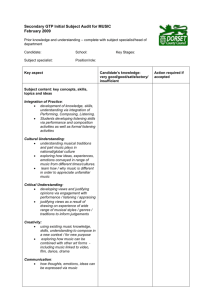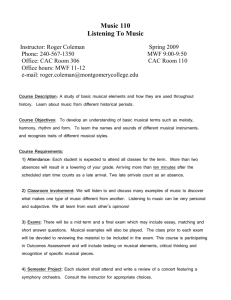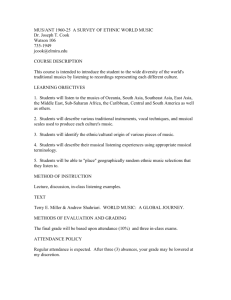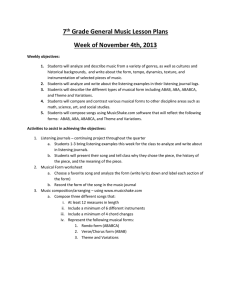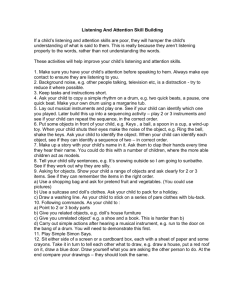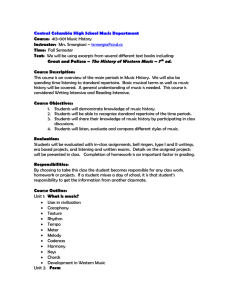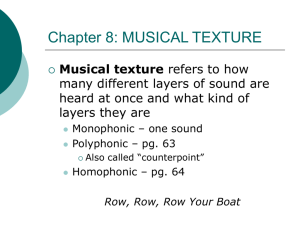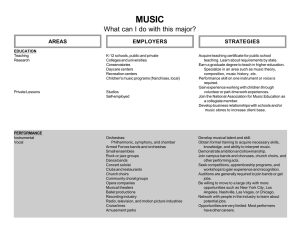Why study music? - Rhinegold Education
advertisement
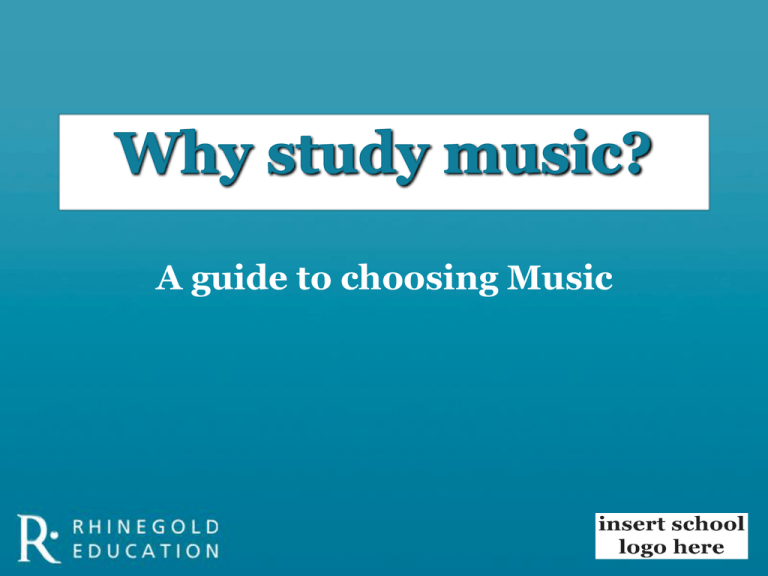
A guide to choosing Music GCSE Music is about making and listening to music. Students will be introduced to a wide variety of musical styles, from popular music to jazz, and world music to Western classical music. They will also be given opportunities to use music technology such as sequencing, mixing and recording. The course covers a range of skills including: • Performing: as a soloist and as part of an ensemble. Exam boards accept a wide range of performance skills from traditional orchestral instruments and singing through to DJing and beatboxing. • Composing: this might be to a particular brief or in a particular style but will enable the student to explore their creativity and musical style. • Listening: the ability to critically appreciate and respond to music as well as analyse its structure and recognise musical devices. Students will enjoy GCSE Music if they want to study a subject that: involves performing involves listening to all kinds of music involves creatively composing or arranging music gives them the opportunity to create and play music with others, for example in a rock group, jazz band, orchestra, or vocal group • gives them the opportunity to use music technology • • • • GCSE Music will add to knowledge previously gained, and allow pupils to develop further in the following areas: • Performing as a soloist, and as part of a group or ensemble • Developing composition techniques to cover all genres of music • Listening to a wide variety of music, and commenting and sharing thoughts with fellow students • Exposure to historical and cultural context of music Students will undertake coursework units for composition and performance, and a written listening exam based on music and musical terms studied throughout the course. Each exam board handles the approach to these units slightly differently and your school will advise on the specific requirements of the course they offer. In order to achieve maximum marks, students will need to be performing at around Grade 4 standard by the end of the course, but it is possible to achieve the qualification from Grade 3 standard. Students will be encouraged to participate in extra-curricular school orchestras, bands and choirs as part of their learning experience. The music industry is a big business and offers a huge range of opportunities in many different careers. Students who study GCSE Music will find plenty of options when it comes to choosing a future path. Equipped with an awareness of musical genres and styles; performing, listening and composing skills; and music technology proficiency, students will be well equipped to pursue a musical profession. But GCSE Music also offers a wealth of transferable skills relevant to ongoing musical and nonmusical study as well as to future career development, including literacy, critical thinking, social skills and team working, leadership and communication, and time management and organisational skills. Rhinegold Education’s new book, Careers in Music, will help students get a feel for the wide range of opportunities on offer in this exciting industry. Available on www.musicroom.com from Autumn 2012 “Doing a music degree helped me gain knowledge in areas of music I was previously largely unfamiliar with. As well as learning from my tutors, I learned a lot from meeting other like-minded individuals on my course which undoubtedly improved my skills in composition, performance and recording.” Sam Harrop “The music courses I took inspired my creativity and also gave me a means of expressing myself.” Sarah Hopkins “I had lots of experience playing with and learning from peers, learning how to absorb a lot of information very quickly, and exposure to the practicalities of music-making… but ultimately you have to create your own routes to find work and reach ambitious careers.” Sam Lung “I’m incredibly glad I studied music; I loved every minute of it and it has enabled me to get a job that I find fulfilling and enjoyable. I also still play, sing, and compose music in my spare time.” Harriet Wybor “It’s all there – a vista of knowledge and skills to be explored. In Music you can play to your strengths and interests, as much as study ‘compulsory’ material.” Matt Allen “Music has always been a fantastic way to meet people, through playing in bands, choirs, orchestras, and going to gigs and concerts. I’ve met almost all of my closest friends through music, in one way or another.” Toby Knowles • It enables creative learning • It allows communication in a unique language • It enables students to express themselves • It broadens horizons • It is varied and interesting, and a journey of discovery • It has links to real life • It is academically rigorous • It is well respected by top universities • It is fulfilling and challenging Rhinegold Education is the UK’s leading provider of music education resources, with a complete range of study guides, listening tests, revision guides, levelled performance repertoire and general reference resources. www.rhinegoldeducation.co.uk @Rhinegoldbooks
